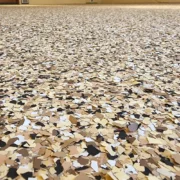The exterior walls of your home not only keep your family safe from the elements; they’re critical in creating the first impression that visitors get of your property.
If it’s been a while since you’ve thought about the condition of your walls, it might be time to take a look. The accumulation of dust, cobwebs, dirt, and mildew can all affect your walls over time, and the build-up can be so gradual that you may not even notice.
Adding an external wall scrub to your spring-cleaning checklist helps to prevent the build-up of grime on the surface of your home which, if left unattended, could cause the building to deteriorate, requiring expensive repairs.
Not sure where to start? Follow these tips to achieve a spotless facade for your home.
1. Choose your cleaning method

Cleaning service washing building facade with pressure water. Cleaning dirty waill with high pressure water jet. Power washing the wall. Ceaning the facade of the house. Before and after washing
Pressure washing services are one of the more popular options for exterior wall cleans, and a great one for time-poor individuals, or for those who simply want the confidence of knowing that their wash will be completed quickly and by experts. It is undoubtedly one of the best ways to clean exterior walls, and consists of a high-pressure spray being applied to remove grime quickly. Detergents can be used with pressure cleaners; however, they’re not necessary.
If you’re considering pressure washing your external walls, make sure that you spot-test the equipment on an unobtrusive section of your wall, as pressure washing can damage some exterior materials. Pressure washing is not safe or recommended for buildings with lead paint, which is common in homes built prior to 1978; paint testing is a great option for anyone who’s unsure whether their external walls contain lead traces. Pressure washing is also not suitable for hardboard siding, as this material is more susceptible to retaining moisture, and can be difficult to repair.
If you’d prefer not to use a pressure washer, you can purchase garden hose attachments for wall scrubbing, or use a long-handled broom and ladder to reach the top. While manual scrubbing can be time-consuming, it’s a good option for those who would prefer to avoid the cost of hiring a pressure washer.
2. Prepare your walls
It’s critical that you take the time to properly prepare for an exterior wash of your home; check for any cracks or broken sealant, where water could potentially infiltrate your walls and cause expensive water damage. Inspect your windows, roof, and any exterior moulding before applying pressurised water, to ensure that they’re in good shape. If any repairs or patches are required before you can move ahead, postpone your clean for about a week to ensure that the repairs are strong enough to withstand whichever cleaning method you’ve chosen.
Take this opportunity to clear any debris that’s built up in your gutters, and any greenery that may be in contact with your walls. Constant contact between your exterior walls and shrubs or branches can add to the dirt and animal droppings potentially causing damage to your home; creating a clear barrier and keeping your gutters clean may help to prevent future build-up on your walls.
If you’re planning on repainting your walls after you’ve cleaned them, try to leave a week between; this ensures that your paint will adhere to the wall without streaking or becoming patchy. Consider which exterior paint finishes will work best for your home, and consult your local paint experts if you’re unsure.
3. Stay safety conscious
A good quality pressure washer will produce a minimum of 2,000 psi (pounds per square inch) of water pressure, which is more than enough to knock you off-balance and cause damage to your home or yourself if used incorrectly. Never point a pressure washer hose at yourself or others, and be extremely careful if you need to pressure wash from a ladder, as the pressure could easily push you backward.
Stand at least a metre back from any wall that you’re cleaning to avoid damage to your building materials, and always have the hose of the equipment pointing downward as you clean. In the even that you need to point the hose upward, ensure that you’re not pointing it anywhere water could enter the home, and make sure to avoid your windows, to prevent broken glass and expensive interior water damage.
Make sure that any extension cords are kept away from water, and use grounding equipment where recommended.
Regular cleaning of your exterior walls is essential in not only keeping your home presentable, but also in preventing damage to your building materials through grime build up. By taking note of the above tips, using the right cleaning method for your circumstances, and staying safe while doing so, you can be confident that your home is retaining the curb appeal that you fell in love with.













Comments